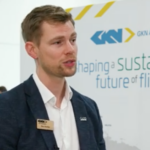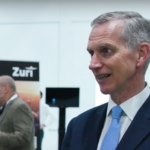The aviation industry must embrace new technology as quickly as possible to achieve a greener future, said Luis Gallego, Chief Executive Officer at IAG, at the Sustainable Skies World Summit 2023.
Speaking to FINN, Gallego said: “The group [IAG] was the first airlines group in the world to commit to net zero emissions by 2050. And we were the first European group to commit to 10% of SAF [sustainable aviation fuel] by 2030.
“We give the airlines the freedom to arrive to these objectives, but from the group we establish what we want to achieve. We understand that in the short term, what we can do is to invest in a new fleet.
“We are also trying to improve the operational efficiency, and for that every year we try to reduce the weight of our aircraft or we are pushing for example to have a ‘Single European Sky’.”
New technology
He added: “New technology is going to be critical for the future, hydrogen etc. But in the short term, what we have is SAF, that’s what we are trying to push. Last year, we ordered 111 new aircraft. So we are trying to bring all the technology that we have available now.”
Asked if the British government was doing enough to push the sustainability agenda forward, Gallego replied: “In the UK the Net Zero Council has been a very good initiative, which we support. It is clear that to have a mandate it is going to help but it’s not going to be enough – we need SAF.
“The airlines want to comply with our 10% of sustainable aviation fuel by 2030. But when we talk to the investors, they tell us that they are not ready to invest unless, for example, they [need a] stability mechanism in order to assume the return of the investment. I think it’s critical to the policy in order to produce the SAF that is going to be required.
“After COVID, sustainability is even more critical than before. It’s difficult for all airlines because we are coming back from the most difficult period in the industry. But as we said before, we are investing in new aircraft, and I think what is going to be important is that there is no single roadmap to the net zero emissions by 2050. We need to be open to the different technologies. Some of them are going to be developed in the future, some of them are available now.”
Subscribe to the FINN weekly newsletter

